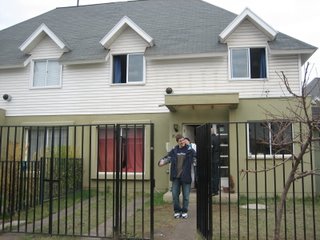Today is the first day of winter vacation, which means no Ojos, pelotas, stabbings with needles, besitos or 'No, tia' for two whole weeks. I'll miss my little ones, but there is much to do, and a whole city to see.
And many people. As my struggle with Spanish continues, I have (with some help) taken matters into my own hands and accepted the fact that when people say "When you live in a foreign country, its really easy to pick up the language" they are dirty liars. So now I have a language partner, and he is as eager to learn English as I am Spanish, which works out quite well.
Thursday we had another VIM (Very Important Meeting) where we all get together and talk about something very important to our work, so that we can think about what we are doing here and why. Many of us don't know why we're here, just that it feels right. As I'm often reminded, I've only been here for a few weeks, which is not necessarily enough time to shape the meaning of your life. So I find these VIM's (my name for them) useful, if for no other reason than I find out a but more about the other voluntarios.
The article up for discussion was 'When Charity Chokes Justice' by David Hilfiker. I wasn't a huge fan. Great ideas, not much follow through and what seemed like a whole lot of complaining. However, it managed to spark a discussion that was unexpected, and different, and not the usual liberal politically correct nonsense that I tend to use in all discussions about social services.
Being around so many Americans (and Hungarians, etc.) I sometimes forget where I am. Sure my tia talks to me about how Santiago is bad, and I'm learning that Chileans feel like bread is the solution to all problems ("The children are cold! Their teeth are chattering! Someone go buy some pan!), but I haven't gotten to the point where I can have one of those conversations yet...about ideals, and goals and family life of a real Chilean. For whatever reason I'm just not willing to ask the right questions because I'm not sure I want the answers. I talk about helping, but I don't know if I'm ready to face how difficult and different life is here, and in turn confront my own guilt.
There are limits to charity. Charity does not solve problems, but symptoms. Sometimes, treating a symptom too well causes the problems to be overlooked. This is Mr. Hilfiker's argument.
And the discussion: I agree that sometimes we're doing more harm than good. Sometimes helping people gives the world at large the sense that everything is ok. Other times, we can actually damage people by giving them something that they should be able to get themselves (that is, through government programs and the like). If charity is too successful, will the government decide that all is well in the world? Will they forget WHY people need our help in the first place? And most importantly, is it all our fault? Does charity equal damage?
We didn't really decide, but we talked about it. Languages and Escudo flying, passion and ideas with no real answers.
When I got home from the discussion, foremost in my mind was that I'd learned the word damage. For some reason, I thought this would come in very handy in the coming days.
But I didn't know how. Until Saturday. It was supposed to be a repair weekend, a chance for us all to get together and complete a project for a hogar. Except, so whatever reason, no one signed up. Well, no one but me, J and C (the Organizer). Since the project was supposed to just be pulling a few posts out of the ground (rock bar? shovel? AmeriCorps?) in the patio of the hogar, we figured we could just get in done, the three of us. But what happened instead was chaos, Chilean style.
The "posts" were huge column-like structures, supporting a canopy covered in branches. If I had remembered batteries, there would be photos now, and all of this would make more sense. If it wasn't 11:45pm I might even draw you a picture of them. These posts were huge and precarious, and embedded in concrete.
But we had a plan: Remove the branch from the top of the canopy, remove the canopy itself one wooden slat at a time, take out the posts one by one. J brought gloves. There were shovels. We could do this.
We went forward with "The Plan", when suddenly 5 Chilean teens (?) showed up and, seeing that we had gotten to work, started pulling on the top of the canopy, causing all of the delapidated posts/columns to bend and shift and make me incredibly nervous. The three of us stopped working to brace the posts while the Chileans pulled away, seemingly unaware of the danger of what they were doing. We tried to tell them to stop, but it didn't register, until finally the posts (wood wrapped in a very heavy plaster) began to fall. This got their attention.
Time to regroup: We exchanged ideas in broken Spanish and got back to work. Our original plan wouldn't work because a) the canopy/columns were just too unstable and b) the alleged "Branches" were still attached to a tree, which we originally did not notice (have you ever felt so stupid that your head hurts and you want to pay your parents back for college? that was me at 11am on Saturday morning).
The new plan involved a big shove, sending the whole structure crashing to the ground. I'm not sure at what point this registered as a "good" plan with everyone, but we all agreed on the course of action. Uno, dos.....calamity.
The force of the falling canopy caused one of the posts to shoot backwards, shattering a window.
The crash sent the kids (who were in the sala, watching all of this unfold) running towards the glass, because that makes sense, gasping and saying "oooooh, tiiiiaaaaaa." The Americans all froze, taking in that one moment full responsibility for everything that had happened and knowing that we blew it. I could tell that the potential injuries shot threw our minds at the same time, as did the feeling of total failure. Is it worth it to take down a few posts if you break a window? Is it worth the damage?
But no one cared. At a hogar for children who are removed from their homes by the police while their parents battle for custody, or go to jail, or kick drug habits, this was not a tragedy. This was a piece of glass that would soon be replaced. The tios were actually satisfied that the sturcture had come down so quickly and that we could now get to work removing all of the wood, chopping down the tree with its tricky branches, and digging what was left of the posts out of the ground.
No one was hurt. We would be more careful going forward.
Then came the sledgehammers and saws and tools that I could not believe were being so freely passed around, but served to very quickly remove the rest of the structure in such a controlled kind of chaos that I can't really remember it. The kids came in and out of the patio, grabbing crumbling, splintered wood with their bare hands to feel helpful and involved. They begged the Chileans to let them use the tools. They asserted that this hogar, however temporarily, was their home, and that they wanted to be a part of it. C cleaned up the broken window, and no one remembered that anything had happened.
I wish I could end this post with "And we left the patio beautiful and new" but I can't. I don't know what it looks like at this moment, because it isn't my hogar, and renovations aren't always completed in one day. After a while we were given the very unglamorous task of scraping old paint off a window because it just needed to be done. The fumes from the paint thinner made us crazy, and the term 'Manpants' was born, for better or for worse. We worked together: volunteers, tios, kids, Americans, Chileans. We learned that there are many kinds of damage, and all you can do is try to fix one thing at a time.
 This time, Salchicho brought a friend. An obviously well cared for Cocker Spaniel who, for some reason, was under the impression that he lives in our house. We have an unspoken "don't adpot a street dog rule" but since we let Salchicho in, in came Crazy the Spaniel. We all know that Salchicho typically comes in to our house, pokes around for a few minutes, and leaves. And he did this on Sunday. Crazy.....not so much. Crazy wanted to stay so we put him outside (heartbreaking in and of itself) and hoped he would go back home.
This time, Salchicho brought a friend. An obviously well cared for Cocker Spaniel who, for some reason, was under the impression that he lives in our house. We have an unspoken "don't adpot a street dog rule" but since we let Salchicho in, in came Crazy the Spaniel. We all know that Salchicho typically comes in to our house, pokes around for a few minutes, and leaves. And he did this on Sunday. Crazy.....not so much. Crazy wanted to stay so we put him outside (heartbreaking in and of itself) and hoped he would go back home.





